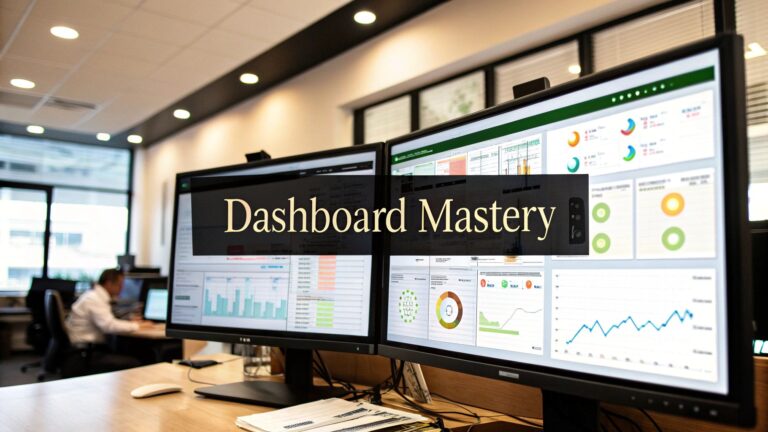12 Best CRM for SaaS Startups to Scale in 2025
Choosing the right Customer Relationship Management (CRM) platform is a critical inflection point for any SaaS startup. The ideal system does more than just store contact information; it becomes the engine for your growth, managing everything from initial lead capture to customer onboarding and long-term retention. A poorly chosen CRM can create data silos, frustrate your sales team, and ultimately hinder your ability to scale. This guide is designed to cut through the marketing noise and provide a clear, practical analysis of the best crm for saas startups available today.
We will dive deep into twelve top contenders, evaluating them not just on their feature lists but on their practical application within a fast-paced SaaS environment. You'll find detailed breakdowns covering specific use cases, honest limitations, and crucial implementation advice to help you avoid common pitfalls. When beginning your search for the ideal customer relationship management system, it's helpful to consider broader market insights, such as the best CRM for small business solutions, as many principles of scalability and usability overlap.
Each review includes screenshots for a visual feel and direct links to get you started quickly. Our goal is to equip you with the insights needed to select a CRM that aligns with your specific business model, from managing trial-to-paid conversions to tracking complex subscription metrics. Let's find the platform that will help you build, manage, and scale customer relationships effectively.
1. HubSpot CRM
HubSpot CRM is often the first platform SaaS startups consider, and for good reason. It establishes a strong foundation for growth by combining powerful contact management with marketing, sales, and service tools in one unified database. This interconnected system makes HubSpot one of the best CRM for SaaS startups looking to build a scalable go-to-market engine from day one, avoiding the data silos that often plague early-stage companies using disparate tools.
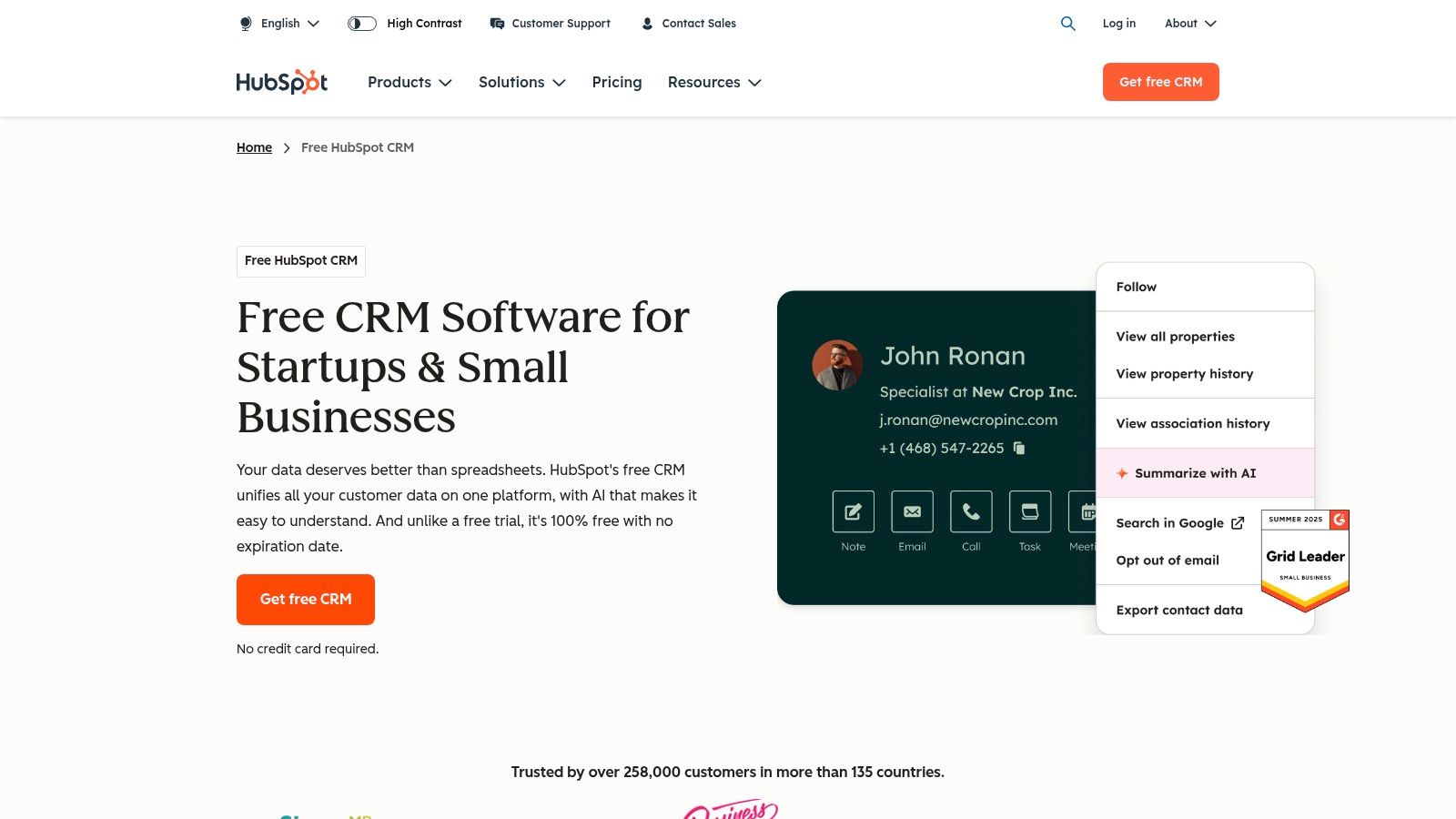
The platform’s standout feature is its generous free plan, which includes essential tools like contact and deal management, email tracking, and pipeline visualization. This allows budget-conscious startups to implement a professional-grade CRM without initial financial commitment. As your SaaS business scales and requires more sophisticated automation or analytics, you can upgrade to its various paid "Hubs" (Marketing, Sales, Service).
Key SaaS Use Case & Implementation
A common use case for a SaaS startup is tracking trial sign-ups. You can automatically create a new contact and deal in HubSpot whenever a user signs up for a free trial. Using simple workflows, you can then trigger a welcome email sequence, create tasks for a sales rep to follow up, and move the deal across pipeline stages based on user activity within your app (e.g., "Trial Activated," "Key Feature Used," "Approaching Trial End"). This ensures no lead falls through the cracks.
Pro Tip: Integrate HubSpot with your product analytics tool (like Mixpanel or Amplitude) to enrich contact records with in-app user behavior data. This gives your sales team powerful context for their conversations.
Pricing & Scalability
- Free CRM: Forever-free plan with robust core features.
- Starter Plans: Begin around $15-20/user/month, adding more automation and removing HubSpot branding.
- Professional/Enterprise: Higher-tier plans unlock advanced features like A/B testing, custom reporting, and predictive lead scoring, but costs can increase significantly.
Website: https://www.hubspot.com/products/crm
2. Zoho CRM
Zoho CRM is a powerful contender for SaaS startups that prioritize deep customization and an all-in-one ecosystem at an affordable price point. While HubSpot excels in ease of use, Zoho offers a granular level of control, allowing startups to tailor modules, fields, and workflows precisely to their unique subscription models and customer journeys. This makes it one of the best CRM for SaaS startups that anticipate needing a highly bespoke system as they scale, without the enterprise-level price tag.
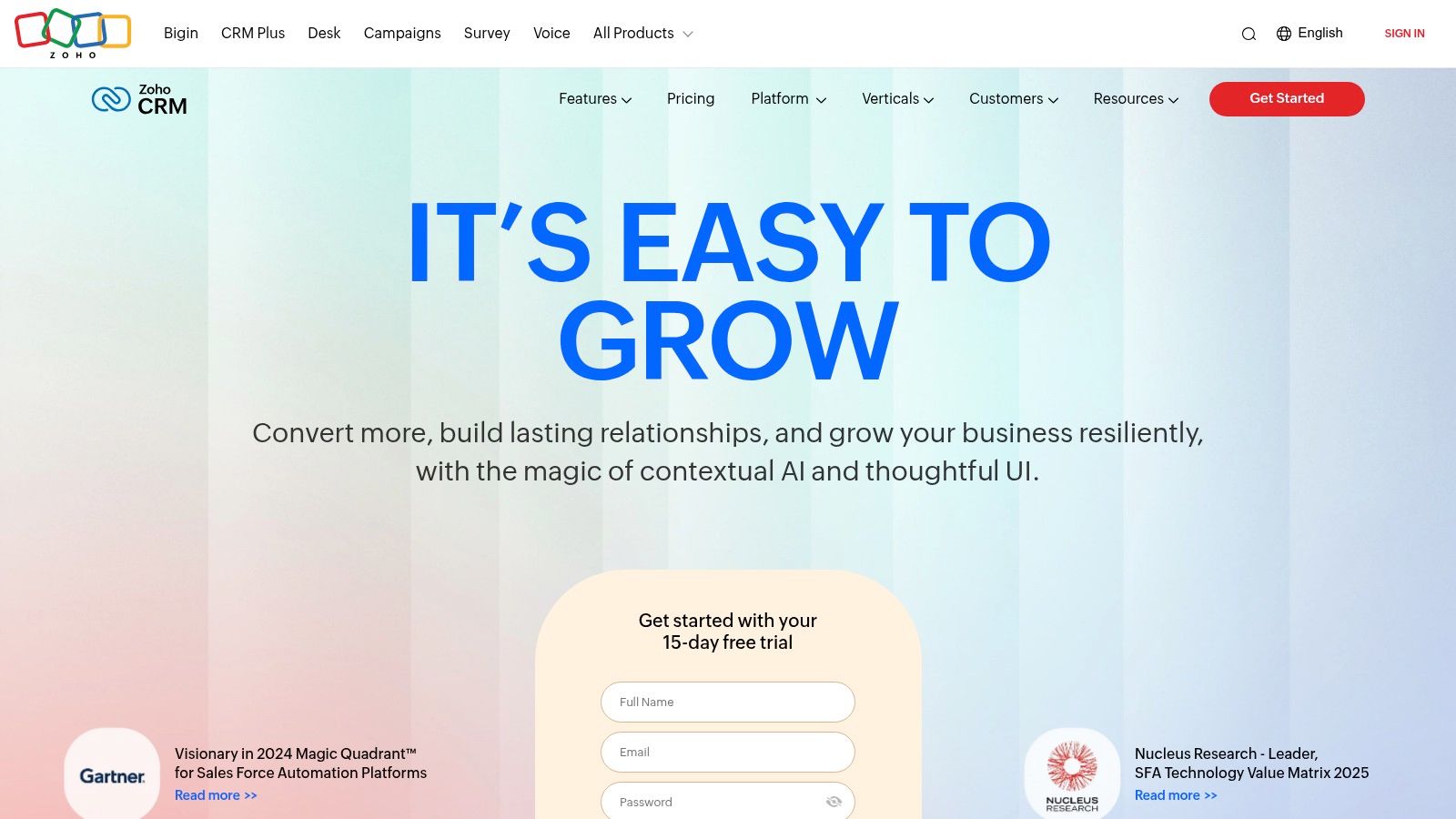
The platform's strength lies in its comprehensive feature set, even in lower-tiered plans. It includes advanced sales automation, multichannel communication tools (email, social, chat), and an AI assistant named Zia to help with predictions and task automation. Its tight integration with the broader Zoho suite (like Zoho Books and Zoho Projects) creates a unified operational backbone for a growing tech company.
Key SaaS Use Case & Implementation
A SaaS startup can use Zoho CRM to automate its entire customer onboarding process. When a customer signs up, a workflow can create a deal and contact record, trigger a personalized welcome email series, and schedule a sequence of follow-up tasks for the customer success team. You can create custom fields to track key SaaS metrics like Monthly Recurring Revenue (MRR) or user activation status directly on the contact or deal record, providing a complete view of customer health. To learn more about this, explore our client onboarding process template.
Pro Tip: Use Zoho's "Blueprint" feature to design and enforce a strict sales or onboarding process. This ensures every team member follows the exact same steps, standardizing the customer experience and data collection.
Pricing & Scalability
- Free Edition: Supports up to 3 users with essential lead, deal, and contact management.
- Standard/Professional: Starts around $14-23/user/month, unlocking workflow automation, inventory management, and deeper customization.
- Enterprise/Ultimate: Higher tiers provide advanced AI features (Zia), multi-user portals, and enhanced analytics, catering to more complex business needs.
Website: https://www.zoho.com/crm/
3. Pipedrive
Pipedrive is built around one core philosophy: sales is a sequence of actions. This activity-based selling approach makes it a standout choice for SaaS startups that need to bring discipline and clarity to their sales process. Its highly visual, drag-and-drop pipeline interface allows founders and sales reps to see exactly where every deal stands, prompting them to take the next required action to move it forward. This makes it one of the best CRM for SaaS startups focused purely on deal velocity and closing.
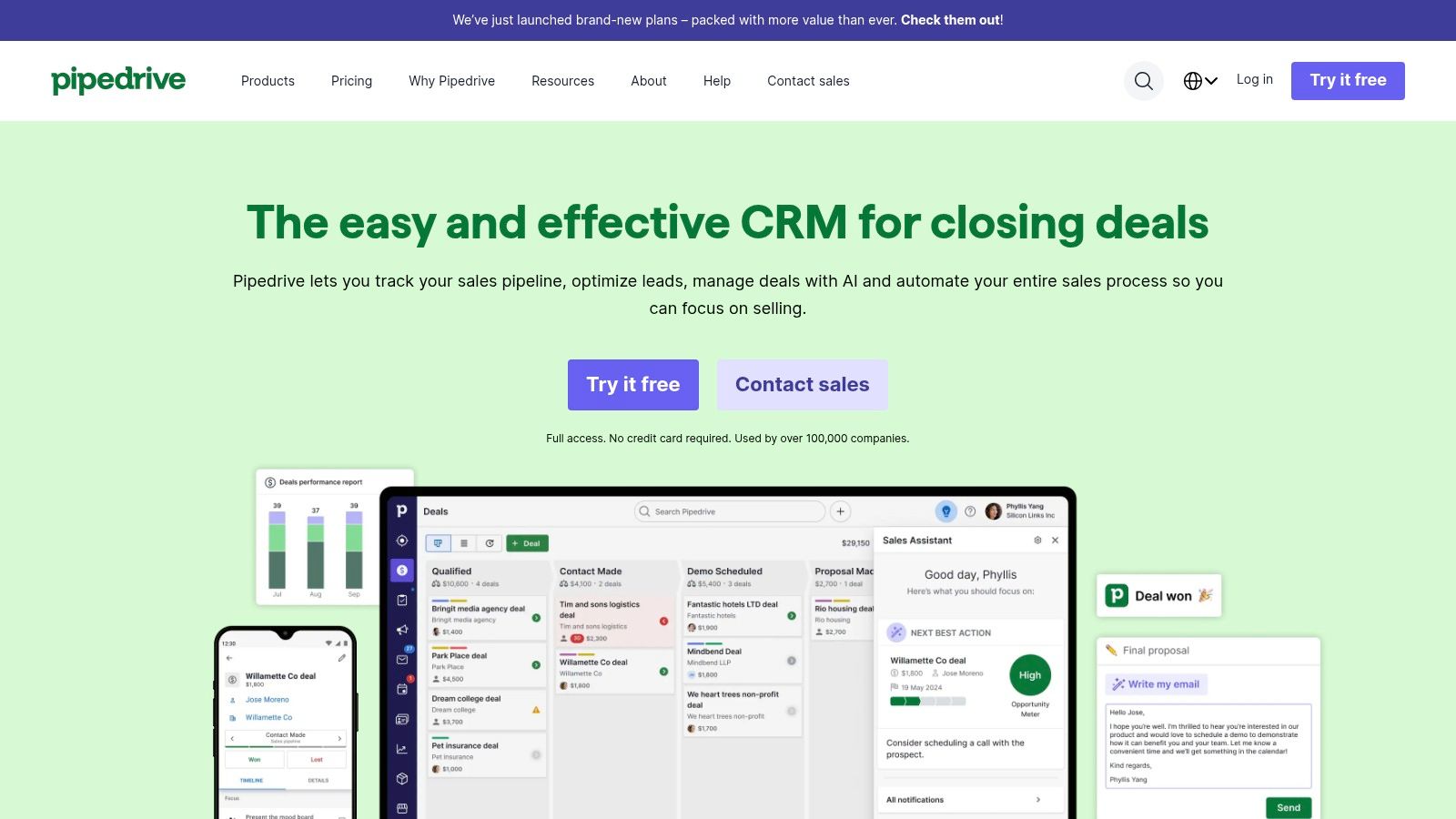
Unlike all-in-one platforms, Pipedrive dedicates itself to being a world-class sales tool rather than a marketing or service hub. This focus results in an incredibly intuitive and easy-to-adopt user experience, minimizing the training time required for new hires. The platform excels at keeping your team focused on revenue-generating activities.
Key SaaS Use Case & Implementation
A perfect use case for a SaaS startup is managing the post-demo sales cycle. Once a prospect completes a product demo, a deal is created in Pipedrive's "Demo Completed" stage. You can then use workflow automation to schedule a follow-up activity for the sales rep (e.g., "Send Proposal in 2 days"). As the deal moves through stages like "Proposal Sent" and "Negotiation," Pipedrive prompts reps with the next logical action, ensuring consistent follow-up and a clear overview of the entire sales pipeline's health.
Pro Tip: Use Pipedrive’s "Rotten" feature to automatically highlight deals that have been sitting in one stage for too long. This helps you identify stalled conversations and proactively re-engage prospects before they go cold.
Pricing & Scalability
- Essential: Starts around $14/user/month for basic deal, calendar, and pipeline management.
- Advanced/Professional: These tiers add more workflow automations, email sync, and group emailing, generally ranging from $24 to $49/user/month.
- Enterprise: A higher-tier plan for larger teams needing enhanced security and unlimited customization.
Website: https://www.pipedrive.com/
4. Freshsales
Freshsales by Freshworks is a sales-focused CRM that excels at providing actionable, AI-driven insights without a steep learning curve. It’s a strong contender for the best crm for saas startups that need to empower a small but growing sales team with powerful tools right out of the box. Its key differentiator is the blend of user-friendliness with sophisticated features like built-in phone, email, and chat, consolidating communication channels directly within the CRM.
The platform’s AI assistant, "Freddy AI," provides predictive lead scoring and deal insights, helping sales reps prioritize their efforts on prospects most likely to convert. This focus on intelligent automation and an all-in-one sales toolkit makes it an excellent choice for teams aiming to maximize efficiency and close deals faster, moving beyond basic contact management.
Key SaaS Use Case & Implementation
A SaaS startup can leverage Freshsales to manage both inbound leads from website forms and outbound prospecting efforts. For example, a sales rep can use the built-in phone dialer to call a list of MQLs (Marketing Qualified Leads). Freshsales automatically logs the call, allows the rep to take notes, and can trigger a follow-up email sequence using automation workflows. The visual sales pipeline makes it easy to drag-and-drop deals as they progress from "First Contact" to "Demo Scheduled" and "Contract Sent."
Pro Tip: Use the workflow automations to create tasks for your customer success team when a deal is marked "Won." This ensures a smooth handoff from sales to onboarding, a critical step for reducing churn in SaaS.
Pricing & Scalability
- Free: A forever-free plan supports up to 3 users with contact management, built-in chat, email, and phone.
- Growth/Pro: Starting around $15/user/month, these plans add sales sequences, advanced reporting, and AI-powered insights.
- Enterprise: Custom-priced tier for larger teams needing advanced customization, dedicated account management, and higher API limits.
Website: https://www.freshworks.com/crm/
5. Close
Close is a high-velocity, sales-first CRM built for remote teams that need to communicate at scale. It consolidates calling, emailing, and SMS into a single, seamless workflow, eliminating the need to constantly switch between different applications. This intense focus on communication efficiency makes Close one of the best CRM for SaaS startups that rely on a high volume of outreach and a fast-paced sales cycle to drive initial growth.
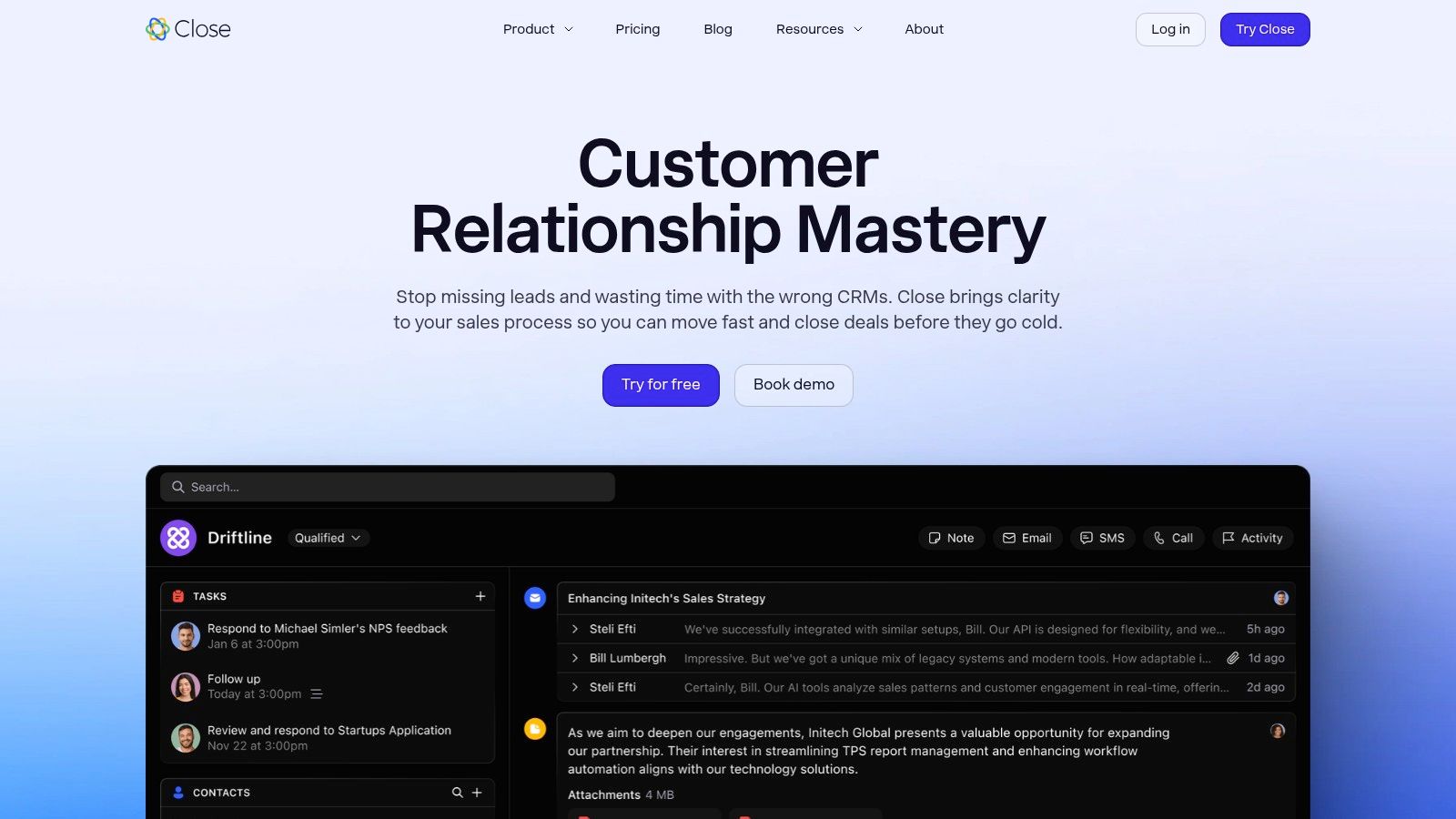
The platform’s standout feature is its integrated Power Dialer, which allows sales reps to make back-to-back calls without manual data entry. Combined with automated email sequences and powerful lead filtering, Close empowers small sales teams to perform with the output of a much larger organization. It’s designed from the ground up to minimize administrative tasks and maximize active selling time.
Key SaaS Use Case & Implementation
For a SaaS startup running an outbound sales motion, Close is a powerhouse. A sales rep can create a "Smart View" to instantly filter leads that match specific criteria, such as trial users from a target industry who haven't activated a key feature. From this list, the rep can launch the Power Dialer to call each lead in sequence. If a lead doesn't answer, the system can automatically log the attempt, drop a pre-recorded voicemail, and enroll the contact in a follow-up email sequence.
Pro Tip: Use Close's API to sync subscription status from your payment provider (like Stripe). This allows you to create Smart Views for churn risks, such as customers with an upcoming renewal date who have low product engagement, enabling proactive outreach.
Pricing & Scalability
- Startup: Starts at $99/user/month (billed annually), with core CRM features and email sequences.
- Professional: Around $299/user/month, adding the Power Dialer and advanced call features.
- Business: The top-tier plan at $499/user/month includes a call coach, custom roles, and a dedicated account manager.
Website: https://close.com/
6. Salesforce Sales Cloud
Salesforce Sales Cloud is the enterprise-grade CRM that many startups aspire to grow into. While often perceived as complex for early-stage companies, it's a powerful choice for SaaS startups with aggressive scaling plans and the resources to support its implementation. Its core strength lies in its near-infinite customization and a vast ecosystem of third-party apps via the AppExchange, making it one of the most adaptable and future-proof platforms available.
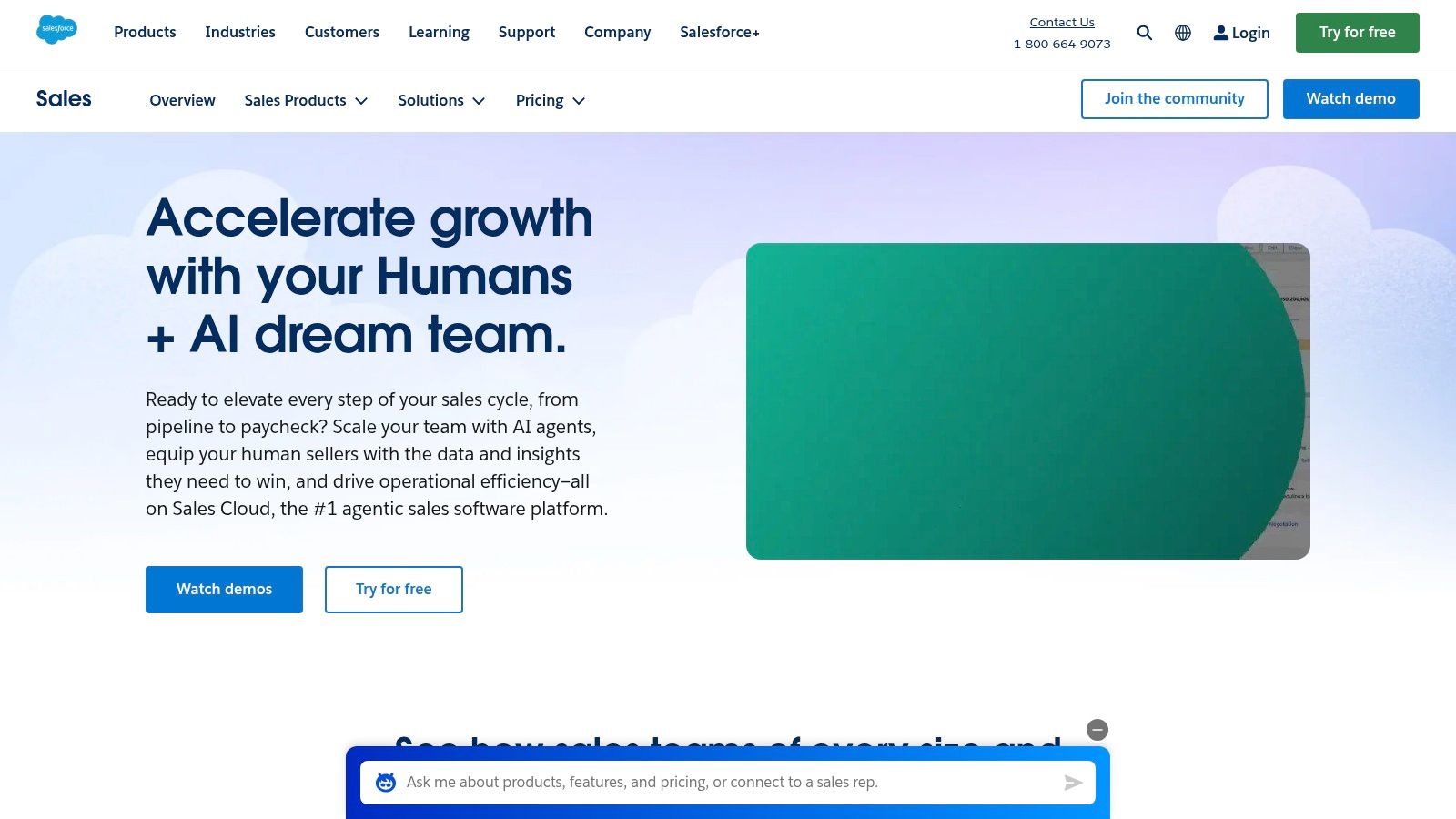
This CRM is built for handling complex sales processes, offering robust features for lead and opportunity management, sales forecasting, and workflow automation from the outset. For a SaaS business managing multi-tiered subscription models, varied contract lengths, and expansion revenue, Salesforce provides the granular control needed to manage and report on that complexity accurately, establishing it as a contender for the best CRM for SaaS startups with sophisticated GTM motions.
Key SaaS Use Case & Implementation
A key use case is managing complex B2B sales cycles with multiple stakeholders. A SaaS startup can configure Salesforce to track an opportunity from initial MQL to closed-won, associating multiple contacts (e.g., the technical buyer, the economic buyer) to a single deal. Custom fields can track specific requirements, like security review completion or custom integration needs. Automated workflows can then assign tasks to technical pre-sales or legal teams when a deal reaches a certain stage, ensuring a smooth, cross-functional sales process.
Pro Tip: Leverage the Salesforce AppExchange to find pre-built integrations for subscription management platforms like Chargebee or Zuora. This creates a unified view of the customer's entire commercial relationship, from initial sale to renewals and upgrades.
Pricing & Scalability
- Starter: Begins around $25/user/month for an out-of-the-box solution with core sales features.
- Professional/Enterprise: These tiers, which most scaling SaaS companies require, offer increased customization, automation, and API access, with costs scaling significantly.
- Unlimited: Top-tier plan with extensive support and full platform capabilities.
Website: https://www.salesforce.com/products/sales-cloud/overview/
7. Zendesk Sell
For SaaS startups already using or planning to use Zendesk for customer support, Zendesk Sell is a natural and powerful extension. It’s a sales-focused CRM designed to minimize administrative tasks and maximize pipeline visibility. By integrating sales and support data, it provides a 360-degree view of the customer, making it one of the best CRM for SaaS startups that prioritize a seamless customer experience from the first sales call to ongoing support tickets.
The platform shines with its user-friendly interface and robust mobile app, empowering sales teams to manage deals on the go. Its core strength lies in its native integration with the broader Zendesk ecosystem, allowing sales reps to see relevant support tickets directly within a deal's context, and vice versa. This unified view helps prevent miscommunication between sales and support teams.
Key SaaS Use Case & Implementation
A powerful use case is managing the handoff from sales to customer success. When a deal is marked "Won" in Zendesk Sell, an automation rule can instantly trigger an action in Zendesk Support. This could create a new organization profile, assign a dedicated support agent, and generate a "Welcome & Onboarding" ticket. This ensures new customers receive immediate, proactive communication from the success team the moment they convert.
Pro Tip: Use the email tracking and automation features to create sequences for post-trial engagement. If a user’s trial expires without converting, automatically enroll them in a nurture campaign offering a demo or a limited-time extension.
Pricing & Scalability
- Sell Team: Starts at $19/user/month (billed annually), offering customizable sales pipelines and core CRM features.
- Sell Growth: Around $55/user/month, adding advanced activity reporting and lead scoring.
- Sell Professional/Enterprise: Higher tiers from $115/user/month unlock task automation, sales forecasting, and more advanced analytics.
Website: https://www.zendesk.com/sell/
8. ActiveCampaign
ActiveCampaign shines for SaaS startups that prioritize sophisticated, automated customer journeys over complex sales pipeline management. While it includes a solid CRM, its core strength lies in its powerful marketing automation engine, making it one of the best CRM for SaaS startups focused on high-touch engagement through email, site messaging, and targeted content. It bridges the gap between marketing efforts and sales conversations seamlessly.
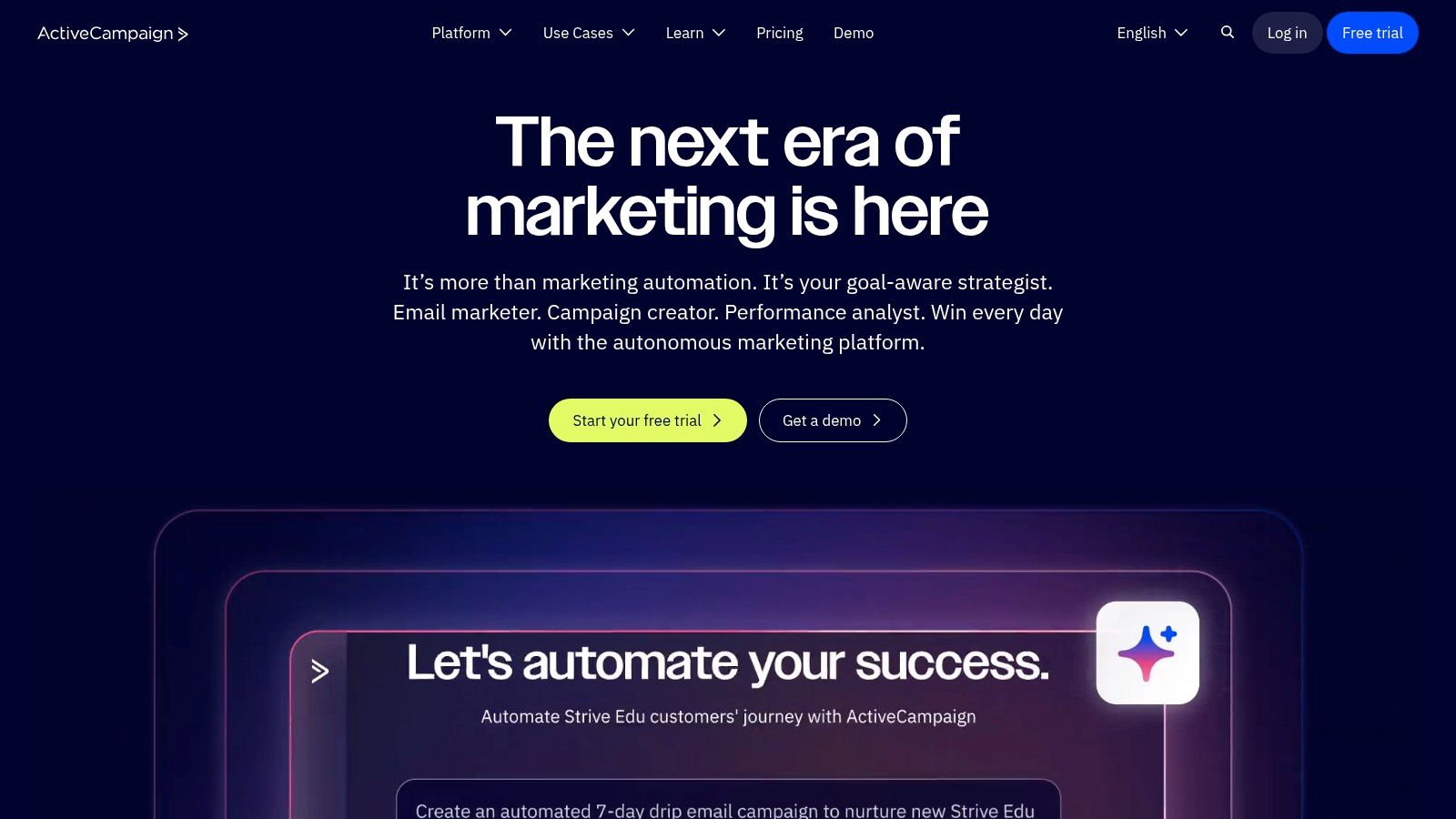
The platform's visual automation builder is a standout, allowing you to create intricate workflows based on user behavior, such as opening an email, visiting a specific pricing page, or using a key feature. This granular control helps startups nurture leads from trial to paid conversion with personalized, timely communication, which is crucial for demonstrating value and reducing churn.
Key SaaS Use Case & Implementation
A powerful use case is creating a dynamic onboarding experience. When a user signs up for a trial, they enter an automation workflow. You can send them a series of educational emails, but also use "if/then" logic to branch the journey. For instance, if a user hasn't logged in for three days, you can send a re-engagement email; if they visit the "integrations" page, you can send a targeted message about connecting their other tools.
Pro Tip: Use ActiveCampaign’s "Site Tracking" feature to monitor which pages on your marketing site a lead visits. This data can trigger automations or provide sales reps with valuable context before a call. You can learn more about these strategies with these marketing automation best practices.
Pricing & Scalability
- Lite Plan: Starts around $29/month, focused mainly on email and marketing automation.
- Plus/Professional Plans: Add the CRM, landing pages, and more advanced features like lead scoring and split automations. Pricing scales based on contact count.
- Enterprise: Offers custom reporting, a dedicated account rep, and more tailored services for larger teams.
Website: https://www.activecampaign.com/
9. Insightly
Insightly carves out a unique niche by blending traditional CRM functionalities with robust project management. For SaaS startups where the sales process is closely tied to implementation, onboarding, or custom development projects, this integration is a game-changer. It allows teams to track a lead from initial contact through to deal closure and then seamlessly manage the subsequent project delivery all within a single platform, making it a strong contender for the best CRM for SaaS startups with a service-heavy model.
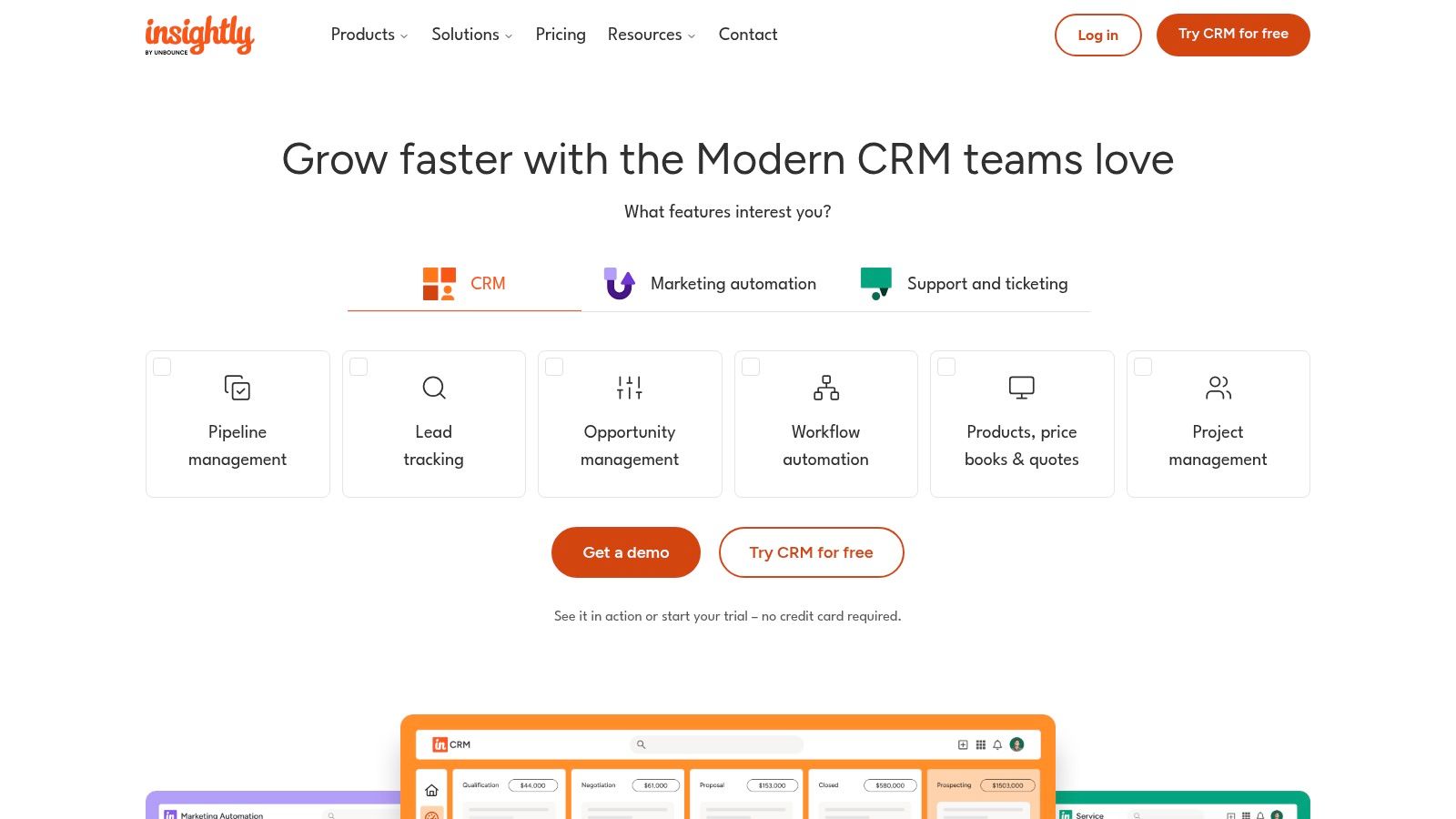
This unified approach prevents critical information from getting lost in the handoff between sales and project delivery teams. The platform's user-friendly interface and affordable entry point make it accessible for early-stage companies that need more than just a sales pipeline but aren't ready for a complex, enterprise-level ERP system.
Key SaaS Use Case & Implementation
A perfect use case is managing post-sale customer onboarding. Once a deal is marked "Closed-Won" in the CRM, Insightly's automation can instantly trigger the creation of a new project from a pre-defined template. This project can include tasks for the onboarding specialist, milestones for key training sessions, and deadlines for technical setup, ensuring a smooth and structured customer experience from day one.
Pro Tip: Use Insightly’s "linking" feature to connect contacts, organizations, deals, and projects. This creates a 360-degree view, so anyone can see the full history of a customer's sales journey and project status in one place.
Pricing & Scalability
- Plus Plan: Starts at $29 per user/month, offering core CRM and project management.
- Professional Plan: Priced at $49 per user/month, adding lead assignment and scheduling features.
- Enterprise Plan: At $99 per user/month, it provides more advanced automation, permissions, and support.
Website: https://www.insightly.com/
10. Copper
For SaaS startups built entirely within the Google Workspace ecosystem, Copper presents a compelling proposition. It’s designed from the ground up to live inside Gmail, Google Calendar, and Drive, effectively turning your inbox into your primary CRM. This native integration eliminates the constant tab-switching that plagues many sales teams and makes it one of the best CRM for SaaS startups that prioritize simplicity and high user adoption within a Google-centric workflow.
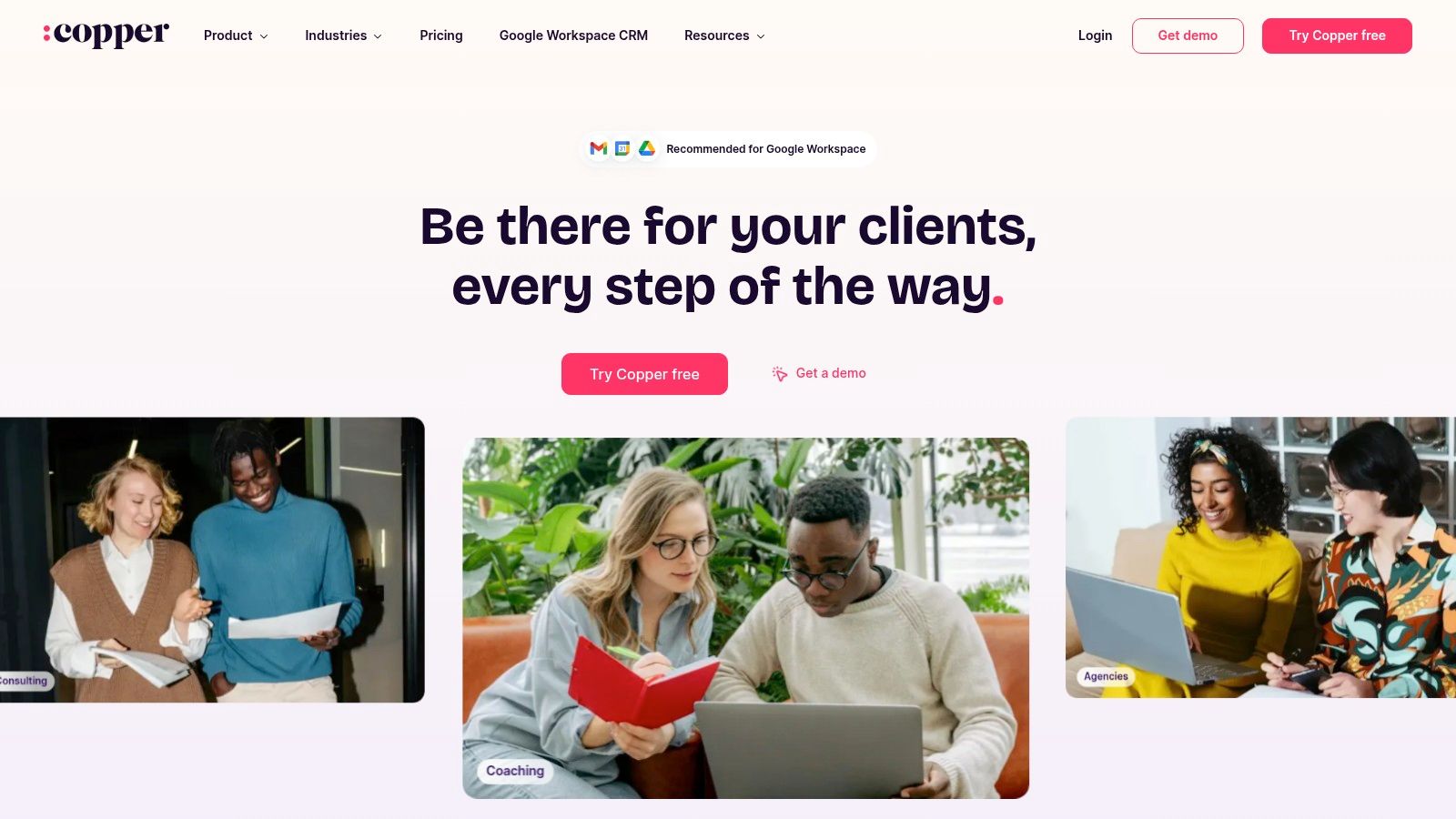
Copper’s main advantage is its ability to automatically scrape contact information, communication history, and files from Gmail conversations, drastically reducing manual data entry. The interface is clean and intuitive, appearing as a sidebar right next to your emails, which encourages consistent use by the entire team. While it may lack the deep customization of larger platforms, its focus on seamless integration makes it a powerful choice for teams that want a CRM that feels like a natural extension of their existing tools.
Key SaaS Use Case & Implementation
A SaaS sales team can use Copper to manage early-stage prospect conversations directly from their inbox. When a demo request email arrives, Copper automatically creates a contact profile with details from the email and signature. The sales rep can then add them to a "Demo Requested" pipeline stage, schedule the meeting via Google Calendar integration, and log all subsequent email exchanges without ever leaving Gmail. This keeps the sales process fast and context-rich.
Pro Tip: Use Copper’s Chrome Extension to capture leads from LinkedIn profiles directly into your CRM. This helps build a targeted prospect list quickly while keeping all contact data centralized within your Google Workspace.
Pricing & Scalability
- Basic: Starts at around $23/user/month (billed annually), built for teams of up to 3 users.
- Professional: Around $59/user/month, adds workflow automation and integration capabilities.
- Business: Around $99/user/month, offers advanced features like email sequences and lead scoring.
Website: https://www.copper.com/
11. Keap
Keap, which evolved from the well-known Infusionsoft, is a powerful option for SaaS startups that prioritize sophisticated sales and marketing automation from the get-go. It tightly integrates CRM functionalities with advanced campaign builders, email marketing, and even e-commerce tools like invoicing and payments. This all-in-one approach makes Keap one of the best CRM for SaaS startups aiming to create complex, automated customer journeys without juggling multiple platforms.
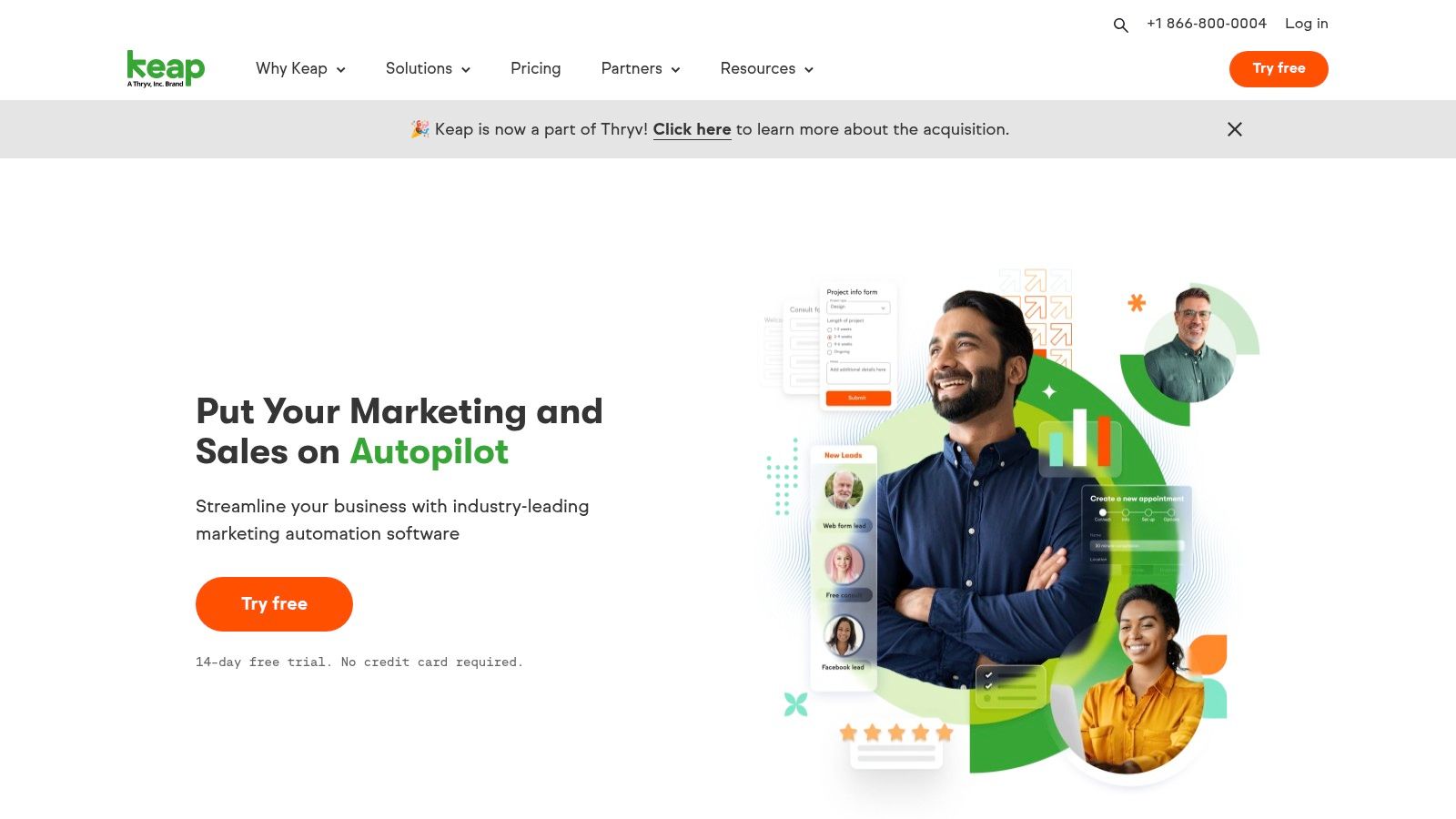
The platform shines with its visual "Easy Automations" and "Advanced Automations" builder, which allows founders to map out entire lead nurturing and customer onboarding sequences. While its comprehensive nature can present a steeper learning curve than simpler CRMs, its power lies in automating tasks far beyond basic email follow-ups.
Key SaaS Use Case & Implementation
A SaaS business can use Keap to automate the entire lifecycle from lead to paying customer. For instance, when a user requests a demo, Keap can trigger an automation that sends a booking link, creates a deal in the sales pipeline, and assigns a follow-up task. If the prospect becomes a customer, the system can automatically send an invoice, tag the contact as "Active Subscriber," and move them into an onboarding email sequence, all within a single automated workflow.
Pro Tip: Use Keap's tagging system extensively. Create tags for different user segments (e.g.,
trial-user,subscribed-tier1,churn-risk) based on their actions to deliver hyper-targeted and relevant marketing campaigns.
Pricing & Scalability
- Pro Plan: Starts around $159/month for 2 users and 1,500 contacts, including CRM, email marketing, and automation.
- Max Plan: Begins at $229/month, adding features like lead scoring and advanced reporting.
- Max Classic: Custom pricing for the most advanced, formerly Infusionsoft, feature set. The pricing can be a significant investment for early-stage startups.
Website: https://keap.com/
12. Bitrix24
Bitrix24 positions itself as a comprehensive business operations suite, extending far beyond a traditional CRM. For SaaS startups seeking to consolidate their tech stack and manage sales, projects, and internal communications within a single ecosystem, it presents a compelling, budget-friendly option. Its strength lies in offering a unified platform where customer data lives alongside project tasks and team collaboration tools, making it one of the best CRM for SaaS startups that prioritize an all-in-one solution from the start.
The platform can feel complex initially due to its vast feature set, but this breadth is also its core advantage. Instead of integrating separate tools for project management or internal chat, Bitrix24 includes them natively. This integration is particularly useful for managing customer onboarding or complex implementation projects tied directly to a sales deal, keeping all communication and tasks connected to the customer record.
Key SaaS Use Case & Implementation
A powerful use case for SaaS startups is managing the post-sale customer onboarding process. Once a deal is won in the CRM, you can use Bitrix24’s automation rules to automatically generate a new project in the project management module. The system can assign tasks to an onboarding specialist, create a shared client communication channel, and schedule follow-up activities. This ensures a smooth handover from sales to customer success without critical details being lost between departments.
Pro Tip: Utilize the built-in communication tools like chat and video calls for client check-ins. All communication history can be logged directly against the contact or company record, providing a complete 360-degree view of the customer relationship.
Pricing & Scalability
- Free: A surprisingly robust free plan for unlimited users that includes core CRM, tasks, and communication features.
- Basic/Standard Plans: Start around $49-$99/month (for the whole team, not per user), unlocking more advanced CRM automation and sales analytics.
- Professional/Enterprise: Higher-tier plans offer advanced business process automation and HR tools, scaling with your operational complexity.
Website: https://www.bitrix24.com/
Top 12 CRM Features & Pricing Comparison
| CRM Solution | Core Features | User Experience | Value Proposition | Target Audience | Price & Plans |
|---|---|---|---|---|---|
| HubSpot CRM | Contact & lead mgmt, email tracking, pipeline visualization, marketing automation integration | User-friendly, generous free plan | Scalable CRM with strong integrations | Startups, growing businesses | Free tier, paid tiers for advanced features |
| Zoho CRM | Sales automation, AI analytics, multichannel communication, custom dashboards | Customizable, steeper learning curve | Affordable, highly customizable CRM | Startups needing flexibility | Affordable, advanced features need higher tiers |
| Pipedrive | Visual sales pipeline, activity tracking, email integration, workflow automation | Intuitive, user-friendly | Focused on sales pipeline & deal tracking | Small sales teams, startups | Affordable, higher tiers for advanced features |
| Freshsales | AI lead scoring, phone/email integration, visual pipeline, workflow automation | User-friendly interface | AI-driven sales automation & insights | Startups enhancing engagement | Affordable, advanced in paid plans |
| Close | Built-in calling/SMS, email automation, smart filters, power dialer | Sales-focused, excellent communication tools | Optimized for remote sales teams | SaaS startups, high-velocity sales | Higher cost as team scales |
| Salesforce Sales Cloud | Contact/opportunity mgmt, lead scoring, forecasting, workflow automation | Robust, steep learning curve | Highly customizable, enterprise-grade CRM | Rapidly scaling startups | Higher cost, multiple pricing plans |
| Zendesk Sell | Custom pipelines, email tracking, automation, mobile app | User-friendly, strong mobile app | Integrates well with Zendesk products | Sales teams using Zendesk | No free tier, paid plans only |
| ActiveCampaign | Email marketing automation, lead scoring, web analytics, live chat | User-friendly, comprehensive automation | Combines CRM & marketing automation | Startups focused on engagement | Can be pricey, advanced tiers |
| Insightly | Contact mgmt, project mgmt, email tracking, workflow automation | User-friendly, affordable | CRM + project management combo | Startups managing projects & sales | Affordable, limited advanced features |
| Copper | Google Workspace integration, pipeline mgmt, task automation | Seamless integration, user-friendly | Ideal for Google Workspace users | Startups using Google apps | Pricing can be high for small startups |
| Keap | Contact mgmt, marketing automation, invoicing, email marketing | User-friendly, strong support | Automates sales & marketing | Startups automating workflows | Higher pricing, steeper learning curve |
| Bitrix24 | CRM, pipeline mgmt, project mgmt, chat/video calls | Comprehensive but complex interface | All-in-one business suite | Startups seeking all-in-one tools | Free plan available, limited customization |
Final Thoughts
Navigating the crowded CRM market can feel overwhelming, but finding the best CRM for your SaaS startup is a critical step toward building a scalable, efficient, and customer-centric business. As we've explored, the "perfect" CRM doesn't exist. Instead, the right choice is the one that aligns with your startup's unique stage, goals, and operational DNA.
The journey from a simple spreadsheet to a sophisticated CRM is a milestone in any startup's growth. It signifies a shift from reactive sales tactics to a proactive, data-driven strategy. Whether you're a lean team needing the all-in-one power of HubSpot or a sales-focused crew that thrives on Pipedrive's visual pipeline, the key is to select a platform that empowers, not encumbers, your team.
Recapping Your CRM Options
Let's distill the key takeaways from our deep dive. Your decision will likely pivot on a few core factors: budget, team size, required features, and long-term scalability.
- For the All-in-One Seekers: Platforms like HubSpot CRM and Zoho CRM offer a comprehensive ecosystem. They are ideal if you want to unify sales, marketing, and service from day one, minimizing integration headaches as you scale.
- For the Sales-Driven Teams: If your primary focus is empowering a high-velocity sales team, tools like Pipedrive and Close are purpose-built for action. Their design philosophy centers on minimizing administrative tasks and maximizing direct selling activities.
- For Future-Proofing and Customization: If you anticipate complex needs and have the resources to invest, Salesforce Sales Cloud remains the enterprise-grade standard. It offers unparalleled customization but comes with a steeper learning curve and higher cost.
- For Specific Niches: Don't overlook specialized options. Copper excels with its deep Google Workspace integration, while ActiveCampaign brilliantly merges CRM with powerful marketing automation, making it a strong contender for startups focused on nurturing leads through sophisticated funnels.
Actionable Steps to Your Ideal CRM
Choosing a CRM is just the beginning; successful implementation is what drives ROI. Before you commit, take these final steps to ensure you're making a strategic investment, not just a purchase.
- Map Your Core Processes: Clearly document your current sales and customer management workflows. Which steps are manual and time-consuming? Where are the bottlenecks? This map will become your shopping list for essential CRM features.
- Involve Your Team: Your sales and marketing teams are the end-users. Involve them in the final evaluation and trial periods. A CRM that your team loves to use will always outperform a technically "superior" one that they ignore.
- Prioritize Integrations: Your CRM must coexist with your existing tech stack. List your essential tools (email, calendar, support desk, billing software) and verify that your top CRM contenders offer seamless, native integrations. This is non-negotiable for a modern SaaS startup.
- Start with a Trial: Never buy a CRM without putting it through its paces. Use the free trial period to run a real-world pilot. Import a small batch of contacts, run a few deals through the pipeline, and test the reporting features. This hands-on experience is invaluable.
Ultimately, the best CRM for a SaaS startup is one that grows with you. It should streamline your operations today while providing the flexibility you'll need tomorrow. By focusing on your specific processes, team needs, and integration capabilities, you can confidently select a platform that will serve as the engine for your growth.
Ready to connect your new CRM to the rest of your tech stack without writing a single line of code? MakeAutomation is a powerful, no-code automation platform that lets you build sophisticated workflows between your CRM and hundreds of other applications. Visit MakeAutomation to start automating your sales processes and unlock your team's full potential.







